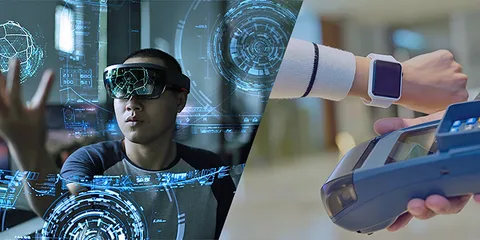Introduction
Wearable health devices have emerged as transformative tools in the healthcare landscape, empowering individuals to take charge of their well-being. As technology continues to advance, the future of wearable health devices holds the promise of even more sophisticated and integrated solutions. This article explores the potential evolution of wearable health devices and their impact on personal health monitoring and healthcare delivery.
Continuous Health Monitoring
The future of wearable health devices lies in continuous health monitoring. Beyond the current capabilities of tracking steps and heart rate, future wearables are poised to monitor a broader array of health metrics in real-time. This includes parameters like blood glucose levels, hydration status, and even biomarkers indicative of specific health conditions. This shift towards continuous monitoring enables a more comprehensive and dynamic understanding of an individual’s health.
Integration with Artificial Intelligence
Artificial Intelligence (AI) integration is set to elevate the capabilities of wearable health devices. AI algorithms can analyze vast datasets generated by wearables to provide actionable insights. From predicting potential health issues to offering personalized recommendations for lifestyle modifications, the synergy between wearables and AI enhances the overall effectiveness of health monitoring and management.
Remote Patient Monitoring
Wearable health devices will play a pivotal role in the paradigm shift towards remote patient monitoring. Patients with chronic conditions or those in postoperative care can benefit from continuous monitoring without the need for frequent hospital visits. Wearables equipped with sensors and connectivity features facilitate real-time data transmission to healthcare providers, enabling proactive interventions and personalized care plans.
Advanced Biometric Sensing
The future generation of wearable health devices will feature advanced biometric sensing technologies. These include non-invasive sensors capable of measuring more complex physiological parameters, such as respiratory rate, blood pressure, and even emotional states. The integration of advanced biometric sensing enhances the accuracy and depth of health data collected, providing a more holistic view of an individual’s well-being.
Seamless Integration with Smartphones and Ecosystems
Wearable health devices will seamlessly integrate with smartphones and broader digital ecosystems. This integration not only enhances user experience but also facilitates the sharing of health data with healthcare providers and other relevant stakeholders. Interconnectivity with health apps, electronic health records, and telemedicine platforms ensures a cohesive and streamlined approach to personal health management.
Personalized Health Insights and Recommendations
As wearables become more sophisticated, they will move beyond data tracking to offer personalized health insights and recommendations. AI-driven analysis of health data will generate actionable recommendations tailored to an individual’s unique health profile. These recommendations may include personalized fitness plans, dietary guidance, and alerts for potential health risks, fostering a proactive approach to health management.
Wearables in Disease Prevention and Early Detection
Wearable health devices will play a crucial role in disease prevention and early detection. By continuously monitoring key health metrics and analyzing patterns, wearables can provide early warnings for potential health issues. This proactive approach enables individuals and healthcare providers to intervene at an early stage, potentially preventing the progression of diseases and improving overall health outcomes.
Enhanced User Experience and Design
The future of wearable health devices will prioritize user experience and design. Slimmer, more comfortable, and aesthetically pleasing wearables will encourage greater user adoption. Intuitive interfaces and user-friendly apps will make these devices accessible to individuals of all ages, fostering widespread acceptance and integration into daily life.
Ethical Considerations and Privacy
As wearables become more ingrained in healthcare, ethical considerations and privacy concerns become paramount. Striking a balance between the collection of health data and the protection of individual privacy is essential. Robust security measures, clear data ownership policies, and transparent consent processes are crucial to ensuring the responsible use of health data generated by wearables.
Conclusion
The future of wearable health devices holds immense potential to revolutionize personal health management and healthcare delivery. From continuous health monitoring and AI integration to advanced biometric sensing and disease prevention, wearables are set to become indispensable tools in the pursuit of optimal well-being. As these technologies evolve, a focus on user experience, ethical considerations, and privacy will be key to unlocking the full benefits of wearable health devices.
FAQs
- What is the future of continuous health monitoring with wearable devices?
- Wearable health devices are moving towards continuous monitoring of a broader array of health metrics, providing a more comprehensive and dynamic understanding of an individual’s health in real-time.
- How does AI integration enhance the capabilities of wearable health devices?
- AI integration allows wearables to analyze vast datasets, providing actionable insights, predicting potential health issues, and offering personalized recommendations for lifestyle modifications.
- What role will wearable health devices play in remote patient monitoring?
- Wearables will play a pivotal role in remote patient monitoring, enabling continuous tracking of health metrics and real-time data transmission to healthcare providers for proactive interventions and personalized care plans.
- How will wearables contribute to disease prevention and early detection?
- Wearables will continuously monitor key health metrics and analyze patterns, providing early warnings for potential health issues and enabling proactive interventions to prevent the progression of diseases.
- What ethical considerations are important in the development of wearable health devices?
- Ethical considerations include robust security measures, clear data ownership policies, and transparent consent processes to ensure the responsible use of health data generated by wearables while prioritizing individual privacy.
